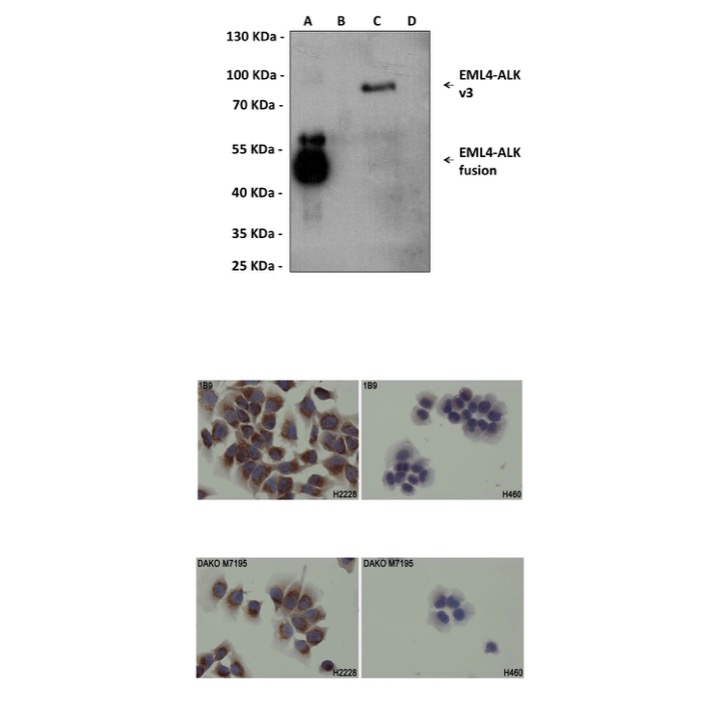Description
BACKGROUND Anaplastic lymphoma kinase (ALK) is a tyrosine kinase receptor for pleiotrophin (PTN), a growth factor involved in embryonic brain development (1-3). In ALK-expressing cells, PTN induces phosphorylation of both ALK and the downstream effectors IRS-1, Shc, PLCγ, and PI3 kinase (1). Moreover, ALK was discovered as a nucleophosmin (NPM)-ALK fusion protein produced by a translocation (4). Investigators have found that the NPM-ALK fusion protein is a constitutively active, oncogenic tyrosine kinase associated with anaplastic lymphoma (4). Research literature suggests that activation of PLCγ by NPM-ALK may be a crucial step for its mitogenic activity and involved in the pathogenesis of anaplastic lymphomas (5). A distinct ALK oncogenic fusion protein involving ALK and echinoderm microtubule-associated protein like 4 (EML4) has been described in the research literature from a non-small cell lung cancer (NSCLC) cell line, with corresponding fusion transcripts present in some cases of lung adenocarcinoma. The short, amino-terminal region of the microtubule-associated protein EML4 is fused to the kinase domain of ALK (6-8). Investigators have identified ALK translocations with other fusion partners, such as TRK-fused gene (TFG) and KIF5B, which have also been associated with NSCLC (6,7). In particular, the EML4-ALK fusion protein has been found in 3-7% of NSCL patients (6-14).
REFERENCES
1. Stoica, G.E. et al. (2001) J Biol Chem 276, 16772-9.
2. Iwahara, T. et al. (1997) Oncogene 14, 439-49.
3. Morris, S.W. et al. (1997) Oncogene 14, 2175-88.
4. Morris, S.W. et al. (1994) Science 263, 1281-4.
5. Bai, R.Y. et al. (1998) Mol Cell Biol 18, 6951-61.
6. Rikova, K. et al. (2007) Cell 131, 1190-203.
7. Takeuchi, K. et al. (2008) Clin Cancer Res 14, 6618-24.
8. Soda, M. et al. (2007) Nature 448, 561-6.
9. Takeuchi, K. et al. (2009) Clin Cancer Res 15, 3143-9.
10. Palmer, R.H. et al. (2009) Biochem J 420, 345-61.
11. Horn, L. and Pao, W. (2009) J Clin Oncol 27, 4232-5.
12. Rodig, S.J. et al. (2009) Clin Cancer Res 15, 5216-23.
13. Mino-Kenudson, M. et al. (2010) Clin Cancer Res 16, 1561-71.
14. Kwak, E.L. et al. (2010) N Engl J Med 363, 1693-703.
15. Martelli, M.P. et al.(2009) Am J Pathol 174, 661-70
Products are for research use only. They are not intended for human, animal, or diagnostic applications.

Top: Western Blot detection of ALK fusion protein expression using ALK-specific monoclonal (1B9) antibody.
ALK is found as a fusion protein in NSCLC cell lines and is reported to be expressed by H2228 cells with a MW of 90kDa (11, 15).
Lane A: 293 cells transfected with plasmid encoding EML4 (1-200aa)-ALK (1421-1620aa) fusion protein.
Lane B: 293 cells transfected with mock vector
Lane C: H2228 cells with endogenous EML4-ALK v3, EML4(1-222aa)-ALK(1058-1620aa), fusion protein.
Lane D: H460 cells (negative control cell lysate).
Middle: Immunocytochemical stainings of H2228 cells and H460 (ALK-negative) cells using ALK-specific monoclonal antibody (clone 1B9). ALK monoclonal (1B9) antibody (1:200 dilution).
Bottom: Immunocytochemical stainings of H2228 cells and H460 (ALK-negative) cells using ALK-specific monoclonal antibody (clone 1B9). DAKO ALK antibody product M7195 (1:200 dilution).
Details
Cat.No.: | CC10035 |
Antigen: | Recombinant human ALK fusion protein (1421-1620aa) expressed in mammalian cells. |
Isotype: | Mouse IgG |
Species & predicted species cross- reactivity ( ): | Human, Mouse, Rat |
Applications & Suggested starting dilutions:* | WB 1:1000-1:2000 IP n/d IHC 1:200 ICC 1:200 FACS n/d |
Predicted Molecular Weight of protein: | 220 KDa (ALK), 80 KDa (NPM-ALK), 117 KDa (EML4-ALK v1), 90 KDa (EML4-ALK v3) |
Specificity/Sensitivity: | Detects endogenous ALK proteins without cross-reactivity with other family members. |
Storage: | Store at -20°C, 4°C for frequent use. Avoid repeated freeze-thaw cycles. |
*Optimal working dilutions must be determined by end user.
Products
| Product | Size | CAT.# | Price | Quantity |
|---|---|---|---|---|
| Anti-ALK: Mouse ALK Antibody | Size: 100 ul | CAT.#: CC10035 | Price: $325.00 |
